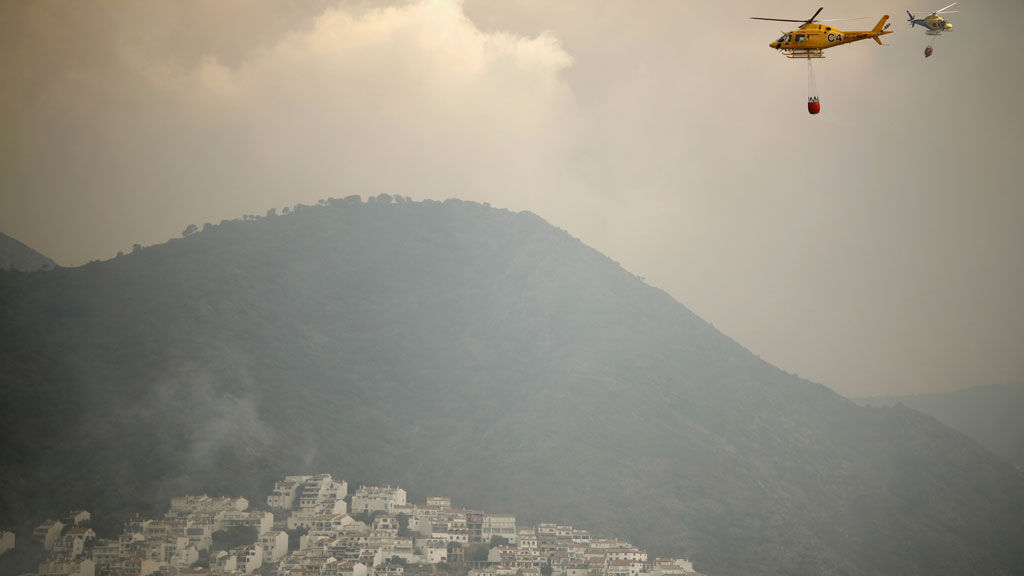The Spanish regions are heavily in debt. People rely on them for free health and education, but they can no longer pay their bills - and they can't expect much help from central government, as it too struggles under a huge financial burden.
You always know if an interview is going to be fun if the interviewee has a sharp, diagonal fringe.
Paula, the pharmacist, has such a fringe, and a grin that suggests she not only understands English but could crack a few jokes in it. But she chooses to speak in Spanish. Because what is happening in Valencia is no fun.
The sign on the wall tells the story. "Important information. The government of Valencia owe this pharmacy for all the medicine we have dispensed to you in January, February, March, April and May".
PaolaPharmacistWe are down to our last packs of insulin - we just have no money to buy the stock”
And not just this pharmacy. The government of Valencia - which runs the health system - owes a grand total of half a billion euros to the region's pharmacies.
Paula guides me into that back room that exists in all pharmacies, where the prescription drugs are kept. The problem is, now, there are not many drugs left.
"Look, this drawer is usually full," she says, pointing to where the suppositories are kept. Now there are only two packets."
She opens the fridge. "Look," she says, "we are down to our last packs of insulin. We just have no money to buy the stock."
I ask: "What happens if several people come in on the same day for insulin?" She makes two fingers walk along the back of her wrist. "They have to go around the neighbourhood to see if anybody else has it. It is the same with drugs for heart disease, stroke, anti-retrovirals."
It is an ordinary pharmacy: clean, white, with the regulation green neon cross outside. Now quite a lot of the patients are having to do something which for them is extraordinary: they are having to pay - a bit - for their medicines. There is a sign on the door explaining the new charges.
The Spanish regions have an extraordinary problem. During the property boom which has now busted Spain, they were collecting some taxes - from, yes, property.
Now that source of revenue is gone, they are expecting the central government to provide them with the cash they need. But the central government is in trouble too: it cannot borrow - except at punitive rates.
Valencia is littered with vanity projects that tell their own story”
The regions cannot borrow either. Valencia's deep in debt and who does pharmacist Paula blame? She smiles bitterly. "That is a very hard question to answer," she says.
In the baking heat outside Valencia's cathedral, there are people who do not find that question hard at all. They are holding up a banner: "The Route of Waste".
Journalists sacked when a local paper closed have taken to doing "citizen journalism" - which today means organising a coach trip around all the various projects Valencia built in the good times.
There is the Formula One racetrack, which runs right through the city so the roads had to be redesigned. But the city has lost its Formula One race.

There is the America's Cup dock, with huge sheds for ocean-going yachts and a massive white control tower. But there is no more America's Cup racing in Valencia.
There is the Opera House, a cross between the one in Sydney and something you would imagine only in your more disturbed dreams - 400 million euros to build, 40 million a year to run - 15 performances a year.
"Yes I am proud of it," says Xabi, one of the tour guides. "Yes the architecture is spectacular. But I would rather have schools."
 The opera house (right) is part of Valencia's "City of Arts and Sciences"
The opera house (right) is part of Valencia's "City of Arts and Sciences"Whether by corruption - and there has been a great deal of that - maladministration, or pure bad luck, Valencia is littered with vanity projects that tell their own story.
The airport that has never seen a single plane land. The theme park built in a place where the summer heat rises above 40C (104F). The land bought at premium prices that is now worthless.
The local press were also on the coach trip. And the next day I find out what they were working on. Headlines about me! They say the BBC's "star economics expert" - thanks for the compliment, guys - has come to Valencia to (here is the subtext) pour scorn on their wonderful infrastructure projects. The story makes the regional daily and thenational conservative daily ABC.
And not only that. There are now angry demands in the official weekly press conference of the government: Why are the BBC here? Have you given them an interview? Will you give us an interview about what you told them in their interview?
"It is Spain," sighs the financial controller of Valencia.
Yes, Spain - where the arrival of the foreign media is a juicy story for the local papers but where massive white elephant projects went unquestioned for a decade, and where the banks that funded them, boards stuffed with appointed politicians, have now gone bust. And where if you need some insulin from the health service, you had better hope you are the first in the queue.



















